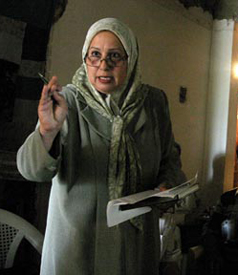Crimean Tartars in alliance with Ukrainian fascists?
Crimean Tartars, blockading the Ukrainian border in protest of Russia's annexation of their homeland, are said to be collaborating with Ukraine's neo-fascist Right Sector.
Crimean Tartars, blockading the Ukrainian border in protest of Russia's annexation of their homeland, are said to be collaborating with Ukraine's neo-fascist Right Sector.
Crimean Tatars pledge to resist Russian demands that they register their Majlis as a "civic organization" and surrender "forbidden" Islamic literature.
Crimean Tatar leaders, forced into exile by Russian judicial orders, accuse Moscow of a campaign of raids and harassment aimed at driving Tatars from the peninsula.
With the open encouragement of Putin, separatists in eastern Ukraine are reviving the concept of "Novorossiya" (New Russia)—a dangerous precedent for revanchist claims.
The Majilis of Crimean Tatars voted to seek "a national autonomous territory" on the peninsula, with leaders calling on their people to stay and fight for their rights.
Russia's annexation of Crimea has sent nearly a thousand of the region's ethnic Tatars fleeing the peninsula for western Ukraine, faced with threats by local authorities.
Thousands of Ukrainian soldiers in Crimea are now facing off with Russian troops and paramilitary forces—with one reported dead as Crimea was formally annexed.
Crimean Tatars held protests in the peninsula, calling for a boycott of the referendum on union with Russia and demanding that Russian troops return to barracks.
Newly appointed Crimean security chief Petr Zima announced new measures against Hizb ut-Tahrir, an Islamist organization with a following among the Tatars.
With pro-Russian gunmen occupying Crimea's parliament and Moscow threatening intervention, the Tatars have emerged as a dissident voice opposing union with Russia.
In the wake of the Volgograd terror blasts, Putin is preparing a new offensive against Chechen insurgents seeking to rebuild the 19th century "Caucasus Emirate."

A 24-year-old Crimean Tatar was sentenced by a court in Russian-annexed Crimea to 10-and-a-half years' imprisonment for supposed involvement in a volunteer force patrolling the border of Crimea and mainland Ukraine to help enforce a blockade. Video evidence introduced in the trial only showed the suspect from behind. Nonetheless, Fevzi Sahandzhy was convicted of being a member of the Asker Battalion—also known as the Noman Çelebicihan Battalion, in honor of the martyred president of the short-lived independent Crimean Republic of 1918. The Battalion began participating in the blockade of Crimea in 2015 to press demands for the release of political prisoners and restoration of freedom of speech and assembly on the peninsula. (Photo: Human Rights in Ukraine)